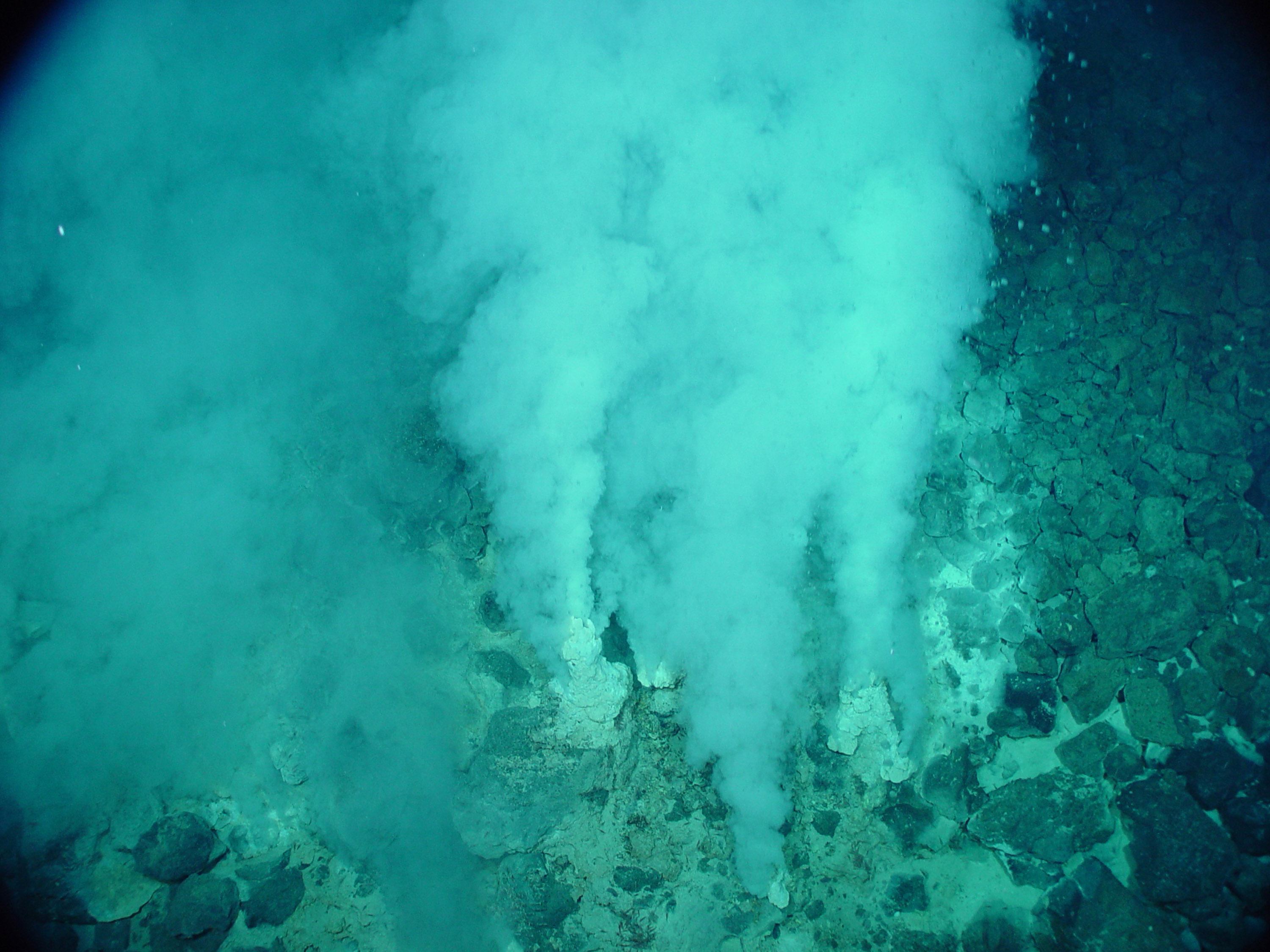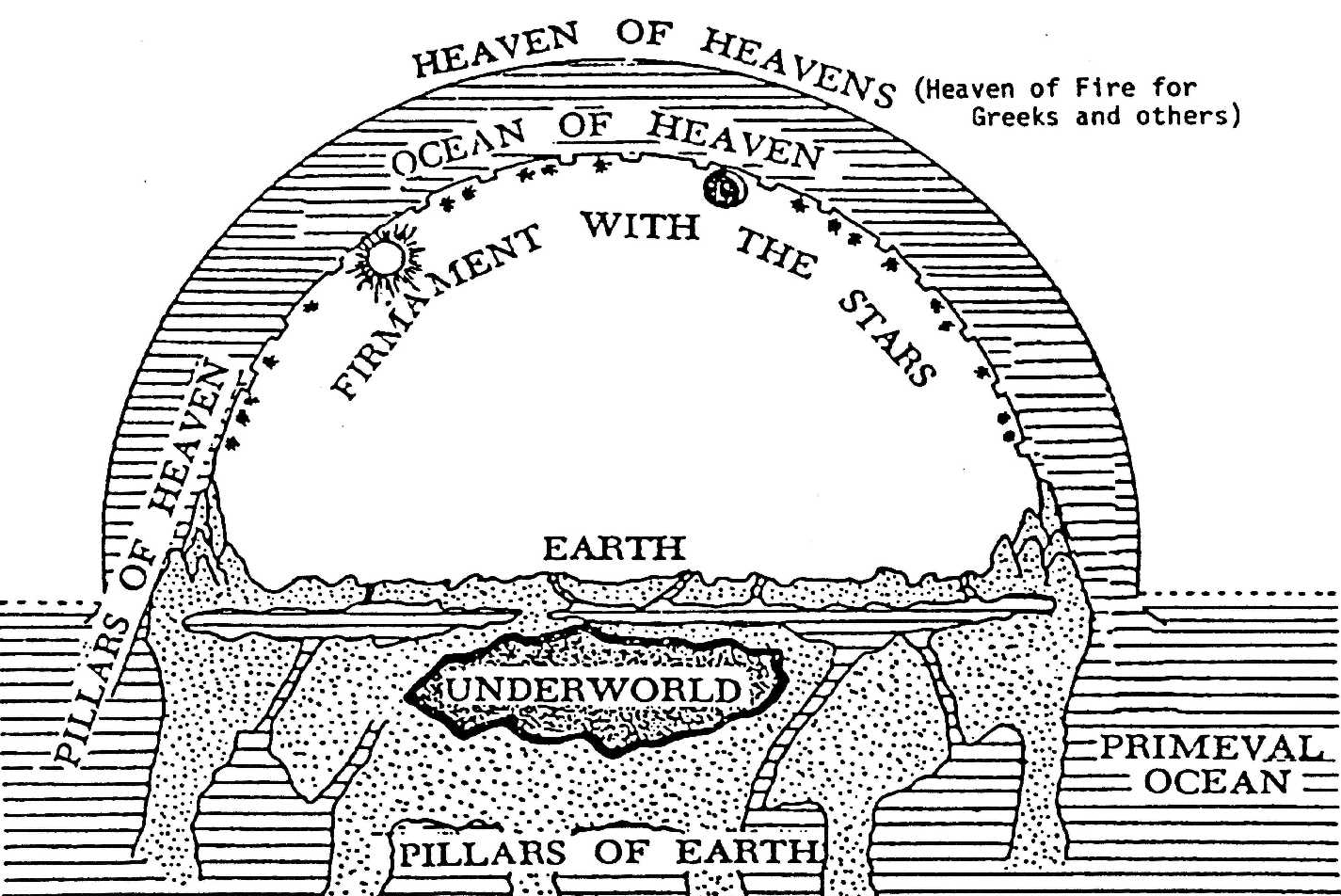The third option of course is that Rev. Barr simply misunderstands the verses he is quoting, and boy oh boy does he misunderstand quite a bit. I will not be addressing the claims of scientific insight, because I think that it's too much to grant even this more basic requirement: that Rev. Barr knows his Bible well enough to even make these claims. These examples cover the majority of those that he chose to present to us, as I remember them coming up, and as our group's silent texting back and forth has documented. I'll give each verse, a paraphrase of Rev. Barr's (mis)interpretation of it, and a much more sensible interpretation that actually takes into account the contexts of the verse itself.
The Verse:
Psalms 42:7: "Deep calleth unto deep at the noise of thy waterspouts: all thy waves and thy billows have gone over me." [KJV]What Rev. Barr says this means:
This was a profound insight into the SOFAR channel, and the waterspouts are hydrothermal vents at the bottom of the ocean floor; the author couldn't have known about these things!
Liquid CO2—liquid—water's a liquid—close enough?
I specify the King James Version above because its translations from Hebrew seem to at times use words that maintain a sort of stylistic poetry, but aren't intuitively the first choice of translation for modern English. For that matter, too, further quotes will be from the KJV.
And since I mention it I may as well start with that: if you go check other versions of the Bible (including the pretty common New International Version), the choice English word is often "waterfalls" or "cataracts" (which basically means waterfalls). This should suggest something very different than hydrothermal vents (which do not spout water).
In fact if you consider what the Psalm is about—which is, in short, an exile lamenting about his apparently broken relationship with God and the turmoil he is going through—the interpretations given in the previous link and in this one paint a very different picture: the author is not referring to the ocean calling itself, he is likening his emotional suffering to a series of waves crashing over him as the waters do in the River Jordan. Why, in the middle of talking about how he is crying at being separated from God and wondering why God has forgotten him, would he throw in a comment about vents at the bottom of the ocean, or SOFAR? It's quite simple: he wouldn't! Rev. Barr should know this.
The Verse:
Mark 9:43-44 (also 45-46, 47-48 in similar style): "And if thy hand offend thee, cut it off: it is better for thee to enter into life maimed, than having two hands to go into hell, into the fire that never shall be quenched: where their worm dieth not, and the fire is not quenched."
What Rev. Barr says this means:
This is another profound insight into the existence of extremophile worm-like organisms, like tube worms!
It's like thousands of little kisses!
Rev. Barr says this is about literal worms, and in a sense it may be correct—the verses mirror a similar statement made in Isaiah 66:24, but the worms that they talk about there are worms (like maggots) that eat decaying bodies; this is to serve as a metaphor for the endless suffering of Hell. There's no reason to suspect that this should be a reference to tube worms, or anything besides that particular example, so long as we're even talking about literal worms. Another interpretation is that "their worm" is a way of expressing "their remorse", but I won't prefer that to the literal worm analogy since there seems to be some contention about that. All seem to agree, though, that this is at best an analogy, to a different type of worm than an extremophile. This is a bit less of a reach than the previous example, but at the same this commentary has existed for a while.
The Verse:
Jonah 2:6: "I went down to the bottoms of the mountains; the earth with her bars was about me forever: yet hast though brought up my life from corruption, O LORD my God."What Rev. Barr says this means:
This is yet again another profound insight into theHe's not too mistaken about most people believing the ocean floor was pretty featureless, but to say that Jonah was talking about mountains in the middle of the ocean seems to ignore two things: first, a much easier interpretation that Jonah was merely talking about the descent down the mountainside of the continent itself, and not mid-oceanic ridges; second, that the Earth as described in the Hebrew OT represented something like this:typographytopography of the Earth's ocean floor, which "scientists" used to think was flat all the way up to the 1800s!
Almost right.
The Verse:
Job 38:30: "The waters are hid as with a stone, and the face of the deep is frozen."
What Rev. Barr says this means:
This is a profound insight into frozen methane clathrates on the ocean floor!
Oooh, purty.
Let's do the timeless and always-fun act of reading some more:
Job 38:25-30: "Who hath divided a watercourse for the overflowing of waters, or a way for the lightning of thunder; to cause it to rain on the earth, where no man is; on the wilderness, wherein there is no man; to satisfy the desolate and waste ground; and to cause the bud of the tender herb to spring forth? Hath the rain a father? or who hath begotten the drops of dew? Out of whose womb came the ice? And the hoary frost of heaven, who hath gendered it? The waters are hid as with a stone, and the face of the deep is frozen."
Oooh, purtier.
When the Bible says "the deep", it almost always refers to the ocean (at times, the waters that were separated into the heavens too, but there is another Hebrew term for this that isn't always translated as "the deep"), or at least the large bodies of surface waters like lakes. And the "face" of these, the surface (as you'll find in other translations) is the top, not the bottom; if God wanted to say that the bottom of the deep was frozen, he would have said so.
But we read this extra text (and the rest of Job 38), and we can see that God is challenging Job's knowledge of the Earth. In particular, here, he is asking if he knows who causes it to rain, and to snow, and—and this is the important part—bring about winter? The two verses, 29-30, are not about the bottom of the ocean, they're about the surface of the ocean freezing over during winter! That's what the hoary frost of heaven alludes to, and why the waters are "hid" (because ice floats atop water), etc. If you read the Bible, these bad interpretations are exposed for what they are.
The Verse:
Job 38:24: "By what way is the light parted, which scattereth the east wind upon the Earth?"
What Rev. Barr says this means:
This is a profound insight into the fact that light can be split by diffraction into its component wavelengths! And that infrared radiation warms the planet!
God had some good taste in music, why not share it with Job?
This was Rev. Barr's pièce de résistance, what he thought was the most amazing "scientific statement" in the Bible. That's a tad unfortunate, because it relies entirely on a misinterpretation of a rather sloppy translation (remember what I said before about the KJV?). In particular, the part "By what way" is a translation from Hebrew "אֵי־ זֶ֣ה דֶּרֶךְ" whose words (read right to left as the language is) give definitions "where", "this, here", and "way, road, distance, journey, manner". God is not asking "what is the mechanism by which", he is asking "where is it to the place", which is what we see in basically every other translation (which are all less ambiguous).
Furthermore, the word that the KJV translated into "parted", "יֵחָ֣לֶק", is a verb that means "deal" as in distributed or dole out. The question, in sum, is better translated as "What is the path to where the light is distributed onto the Earth?" And this would somewhat better match the style of the next part asking about the east wind, and how it is broken into pieces across the Earth.
Since the rest of Job is asking "where do these things come from", as in literally where, and since the words do not actually translate as Barr is interpreting them, this suggestion that the authors were talking about diffraction of light is indefensible.
The Verse:
Isaiah 43:16: "Thus saith the Lord, which maketh a way in the sea, and a path in the mighty waters;"What Rev. Barr says this means:
This is a profound insight into the existence of ocean currents! The Jews couldn't have known about this all on their own.I end with this verse, for a particularly good reason. Not because Rev. Barr thinks this is the best one, but because it is the most atrociously cut quote he came out with. I rebut by making a simple observation: it ends with a semicolon. Why is this relevant? Because it continues:
Isaiah 43:17: "Which bringeth forth the chariot and horse, and army and the power; they shall lie down together, they shall not rise: they are extinct, they are quenched as tow."
A path in the mighty waters...
It's a direct reference to Exodus! How could you possibly not notice that?! There is zero ambiguity about what event this is referencing, the author of Isaiah is not talking about the ocean currents! He's talking about the parting of the Red Sea and the crushing of Pharaoh's Army!
Lying(?) for Jesus
Rev. Barr said that he found about 60 such "scientific facts" in the Bible. But apparently, of those he cited to us, he can't even correctly explain what it was the Bible was talking about, even though you could read the sentence before, or the sentence after—or even finish reading the sentence itself—and it is clear that the topic is completely not what he says it is. For someone who has a Doctor's in Divinity and who has allegedly studied the Bible both for his books and for his job as a pastor, this is either an embarrassing amount of oversight or, as seems much more plausible, an indefensible array of intentional misrepresentations, i.e. lies. And this doesn't even get into the actual "science" of any of the other citations or of his beliefs; since Rev. Barr is a young Earth creationist though, that may have to wait until I have the time to write books myself.








An idea that has permeated Christianity is the idea that there are multiple, simultaneously correct interpretations of a scripture. For anyone that was convinced by Matthew's prophesies that Jesus supposedly fulfilled, the Bible has multiple layers of truth to it. There is what was communicated to the original audience, and there is what is an eternal message for all. This divine double entendre keeps people from reading too much into any scriptures and claiming that a mystical foreknowledge is buried for those who look.
ReplyDeleteIt's a dumb idea, but it is a way that believers can hold multiple wildly different interpretations of the same writings. With that in mind, I don't think that Barr would see the context of the cited scriptures as reason to think that God didn't intend a special meaning alongside it.
Unless it's a flat Earth; cuz that stuff's just wrong.
It's a fantastically underwhelming undertaking of his then if he only found 60 examples of these scientific insights.
ReplyDelete